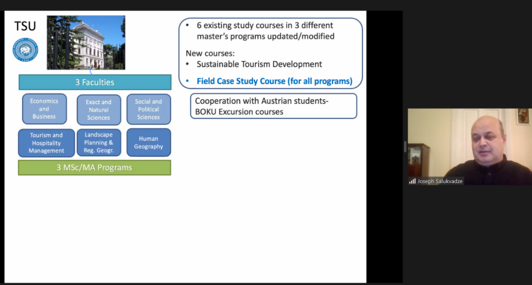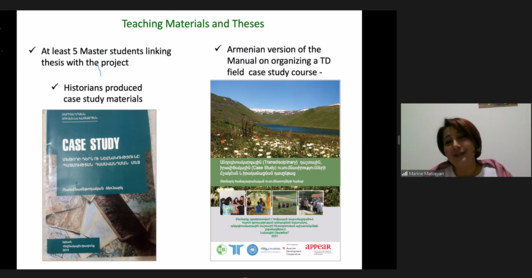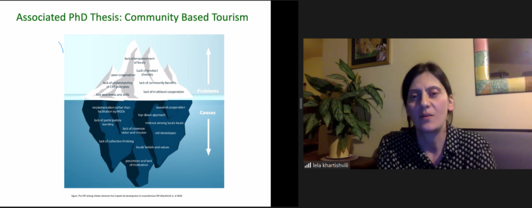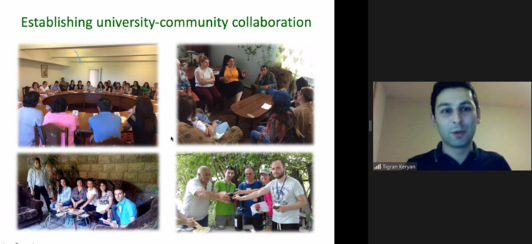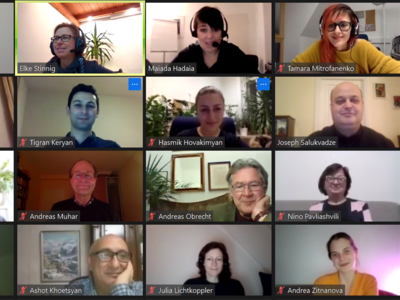

The project CaucaSusT – Transdisciplinarity for Sustainable Tourism Development in the Caucasus Region – aimed at supporting universities in Armenia and Georgia to work more closely with rural communities on sustainable tourism development. On 27 January 2021, in the framework of the event series APPEAR in practice, representatives of all four project partners presented the results of their project, which lasted from 1 July 2016 - 30 November 2020.
The core of the project constituted a Transdisciplinary Case Study Course, which was co-developed by the partners, integrated into the curricula of ASPU and TSU, and carried out in various mountain communities in Armenia and Georgia for three consecutive years. The course theme - sustainable tourism development – was selected jointly by the partners based on the strategic economic development priorities of Armenia and Georgia. The aim of the course was to co-create recommendations and potential solutions for sustainable tourism development in the rural communities, via close collaboration by the interdisciplinary team of students and teachers with the local stakeholders. The lessons learned and the gained experience among all project partners of developing, integrating and implementing a Transdisciplinary Field Case Study Course was brought together in a Manual for University Lecturers, which was produced in English, and then translated and adapted to Armenian and Georgian.
Capacity building and networking of young scholars was also supported through a transdisciplinary Summer School, organized by the project partners in Kazbegi, Georgia, in cooperation with Leuphana University Lüneburg and the Doctoral School Transitions to Sustainability (T2S) at BOKU. Participants from 17 different countries, including the 6 Caucasus countries, representing different cultural and professional backgrounds, joined the Summer School. They learned about the theory and practice of transdisciplinarity, and practiced co-developing transdisciplinary research designs in interdisciplinary groups. The CaucaSusT Project furthermore had a broader regional component – sharing its insights and experience with the Scientific Network for the Caucasus Mountain region, in order to promote transdisciplinary and participatory approaches and contribute to a stronger role of academia in sustainable development processes in all Caucasus countries.
The project outcomes demonstrated that integration of transdisciplinary approaches to teaching and research in Armenian and Georgian universities is possible, given the interest and motivation of university staff and administration. Teachers and students can contribute to addressing real-life challenges of the local communities, and the latter welcome collaboration. Interdisciplinary and transdisciplinary courses offer new insights and practices to the students, motivating them not only to learn, but also to make contributions towards solving societal problems. Moreover, there is potential for longer-term collaboration between universities and non-academic actors.
Long-term outcomes of the project include: 1) integration of inter-and transdisciplinary approaches into TSU and ASPU, established collaboration and a friendly working environment among teachers and students from several faculties, including via teaching and research; 2) integration of the project results on the regional level into the activities and resulting publications of the Scientific Network for the Caucasus Mountain region; 3) deeper insights into community-based tourism in the Caucasus and into the challenges and opportunities of integration and implementation of transdisciplinary approaches into Post-Soviet academic systems; 4) capacity building of a number of project staff at all project partner universities, and establishment of high level expertise in the field of community-based tourism and transdisciplinary approaches in Armenia and Georgia; 5) established collaboration among TSU and ASPU with several communities in Armenia and Georgia.
Speakers of the event in alphabetical order:
Tigran Keryan is finalizing his PhD associated with the CaucaSusT project at the Doctoral School Transitions to Sustainability (T2S) at the BOKU University of Natural Resources and Life Sciences in Vienna, Austria. His thesis is focused on integration of Transdisciplinary approaches in post-Soviet countries. Before beginning his PhD, he worked as a geography and environmental sciences school teacher in Armenia and was involved in different tourism and youth development projects.
Lela Khartishvili finished her PhD study associated with the CaucaSusT project as part of the Doctoral School Transformation to Sustainability (T2S) at the BOKU University of Natural Resources and Life Sciences in Vienna, Austria. Her thesis was focused on community tourism development in the Caucasus region. She works as a national consultant on rural tourism in various international projects in Georgia, and is designing training modules for rural and creative tourism entrepreneurs with Georgian Art conservation Centre.
Marine Matosyan supported coordination of the project activities on behalf of the Armenian State Pedagogical University (ASPU). She has a PhD in Geographical Sciences, and is an Associate Professor of the Chair of Geography and its Teaching Methods at ASPU and the author of multiple scientific-methodological articles, with a thematic focus on territorial management, regional policy, tourism, and geographical culture.
Tamara Mitrofanenko managed the project on behalf of the University of Natural Resources and Life Sciences, BOKU, Institute of Landscape Development, Recreation and Conservation Planning (ILEN). She combines her work at BOKU with supporting activities of the United Nations Environment Programme (UNEP) Vienna Office, Secretariat of the Carpathian Convention, in the Caucasus and the Carpathian Mountain regions.
Prof. Joseph Salukvadze coordinated the CaucaSusT project on behalf of Tbilisi State University (TSU). He is the head of the department of human geography at the faculty of social and political sciences, and a supervisor of the doctoral program in 'Urbanism'. Prof. Salukvadze is a member of the steering committee of the Scientific Network of the Caucasus Mountain Region. His academic interest is focused on urban studies, land policy and land-use planning. He served as the vice rector of TSU from 2014 to 2017, and as the deputy president of the Georgian Geographical Society from 2008 to 2016.
Welcome remarks: Matthias Themel, Austrian Development Agency
Facilitator: Maiada Hadaia, OeAD

